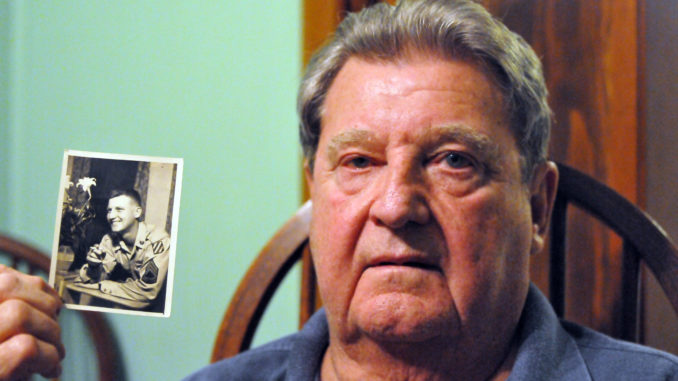
Buddy Keating spent 9 hard months fighting in the mountains of Korea
A young picture of Buddy Keating shows him smiling and enjoying a cigarette on “R and R” in Japan. On the sleeve of his shirt are the visible three chevrons up and two stripes down of a sergeant 1st class–a rank that, today, takes an average of 12 and a half years to attain.
Keating served in the U.S. Army for 21 months.
“At that time, I spent most of my time on the line,” Keating said. “You get promoted.”
In January of 1952, the 21-year-old worker at a New Orleans steel company found himself undergoing months of training in preparation to invade what is now North Korea. Keating was drafted to the front lines of the “forgotten war” with the 3rd infantry division, 7th regiment. As soon as 10 days after he arrived, Keating experienced his first, but not last, dose of combat.
Keating said they fell under an ambush while out on patrol. With enemy rifle fire cracking all around them, they were ordered to shoot–this action convinced Keating’s sergeant that their unit was outnumbered by the enemy. Knowing that, his unit retreated up into a mountain forest where the enemy began shelling them with artillery.
“They were chopping them trees down with the artillery–sooner or later they’d have got us,” Keating said.Cut off from the American front line, a sergeant that Keating describes as a “John Wayne,” managed to get the unit over to the front line of the Greek forces.
The action earned him his combat infantryman’s badge, a distinction which, he said, he is much more proud of than his purple heart.
Keating said he earned his purple heart, which is issued to those soldiers that have been wounded in combat, only days before he was scheduled to ship out of the country. The Chinese had mounted a major assault and Keating, a machine gun squad leader, was dispatched with others to help them out. What Keating and his men did not know, however, was that the mountaintop they were dispatched to had been overrun and enemy soliders had occupied the trenches.
“They [the Chinese] were in there waiting for us,” Keating said. “We lost a lot of men ourselves, but we were able to overrun them.”
It was during this action, and the efforts to hold the hill, that Keating’s squad was hit by an artillery shell. Five men were wounded, including Keating, who suffered lifelong hearing damage. He spent seven days in the hospital before be rotated back to the front line.
Keating said that, despite the Korean war being the “forgotten” war, he knows what a difference the American presence made there. He showed pictures of what is now South Korea, it’s people living in relative squalor. The train station in the large city, he said, used rusty troughs in place of urinals. Today, he sees the thriving economy of a nation that is set to host the 2018 winter Olympics and he’s proud.
Keating’s said he was on the first boat home from the war, but the soldiers were greeted with little more than cookies, orange juice and a small military band when it arrived in San Francisco.
“My wife scanned the papers, looking for when I was going to come home,” he said, “she found a tiny blurb on, I dunno, the 99th page or something.”
Keating went on to become the St. Charles Parish VFW’s first commander, serving in that role from 1967 to 1969. He continued for another four years after as the commander at the district level. During that time, he repeatedly earned all-state and all-nation honors for his command of the VFW post.
Though Keating came back to his job at a steel company, the company folded shortly thereafter. He worked for Monsanto in Boutte for 37 years after.
Today, Keating enjoys a quiet life in Boutte, but the effects of war continue to haunt him. After years of ear drops and unsuccessful treatments, he only recently received hearing aids. He shuffles at a slow pace and, after a recent doctor’s visit, a nurse told him that the trouble in his leg might be related to the substandard equipment he was issued to combat Korea’s -30 degree temperatures. He struggles to remember one of five comrades who deployed with him, digressing. He pauses, remembering a soldier that came to his aid while he was wounded and was shot in the side.
“I remember all the others– why can’t I remember his name?” Keating asks himself.




Be the first to comment